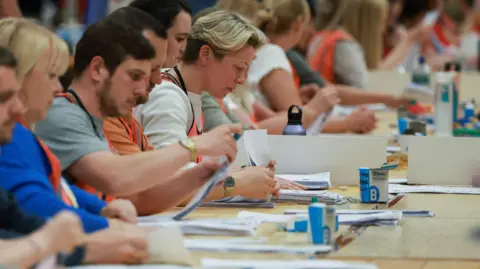In the recent political landscape, the by-election held in Runcorn and Helsby has garnered significant attention, primarily due to its nail-biting outcome marked by an unusually tight contest. The recount between the Reform UK party, led by prominent figure Nigel Farage, and the Labour Party revealed a mere margin of four votes separating the two parties. Such a narrow result has drawn considerable interest as it potentially signifies shifting political loyalties within the electorate.
Initially, the first tally suggested that Reform UK had gained a slight edge over Labour, which is particularly crucial given that this by-election represents a critical moment for the Labour Party under the leadership of Prime Minister Sir Keir Starmer. The need for this by-election emerged after the resignation of former Labour MP Mike Amesbury, who left his position following a conviction for assault. This situation set the stage for Reform UK to make a significant stride toward its ambition of securing its first by-election victory.
Farage has expressed confidence in the outcome, suggesting he believes the party will indeed emerge victorious from the recount, despite the juxtaposition of Labour having initiated the recount process. He indicated that this contest could mark a pivotal moment for Reform UK, especially as Labour managed to hold onto several mayoral races earlier on the same election night. The stakes were incredibly high as any significant win for Reform UK could underscore their growing influence.
Historically, the Runcorn seat had been a bastion for Labour, boasting a considerable majority of 14,696 votes during the last general election. The ongoing tensions and competition were palpable as party representatives gathered at the counting venue, where bundles of ballots were meticulously examined. Adding to the drama, an attending party member signaled to a colleague by holding up four fingers, indicating the close nature of the ballot count and the impending recount.
The narrowest recorded by-election result thus far was in Berwick-upon-Tweed in 1973, where the Liberals triumphed by a narrow margin of just 57 votes — a record that could be threatened by the current Runcorn proceedings. Following the early results, it was observed that Labour retained the mayoral positions in North Tyneside and Doncaster by slender margins of only a few hundred votes. Meanwhile, in the West of England mayoral contest, Labour clinched a majority of 5,949, outperforming the Tories, who were relegated to the fourth position, trailing behind Reform and the Greens.
Despite Labour securing these initial victories, the share of votes for the party plummeted, with Reform UK emerging as a close second in all three mayoral contests. The evolving picture revealed a potential reconfiguration of voter preferences, notably with Reform UK on the upswing. Their aspirations continue as they eye further gains in other elections, particularly in Greater Lincolnshire, where they believe they could secure additional victories in council elections.
Prominent figures within Reform UK, such as Deputy Leader Richard Tice, have expressed optimism about the party’s candidate Andrea Jenkyns winning the Greater Lincolnshire mayoral race by a substantial margin. The party’s strategic ambitions also include targeting councils in regions such as Kent and Lincolnshire, where Conservative majorities are currently robust, while simultaneously aiming to capture seats previously held by Labour.
As this political narrative unfolds, it remains to be seen how these developments will influence voter sentiment ahead of future elections. Political analysts have underscored that support for Reform UK has surged in national opinion polls since the previous year’s general election, where they managed to secure over four million votes, placing them third behind Labour and the Conservatives.
For voters eager to stay informed about ongoing results and additional responses to these electoral developments, various platforms such as BBC One, BBC iPlayer, and the BBC News Channel offer comprehensive coverage. The excitement surrounding Runcorn’s recount demonstrates the unpredictability and intensity of local electoral politics, signaling potential shifts that could redefine the political map in the coming years.



